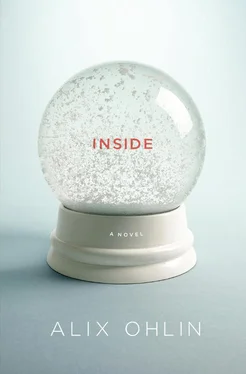“Martine,” he said.
She threw her cigarette down and stubbed it out with the pointy toe of her boot, rubbing the black stain of ash into the sidewalk. When she finally met his eyes again, she just shrugged. Mitch knew, then, that Mathieu was with a man, not a sitter, and that this man had, in a matter of weeks, already gotten further with her than he ever had.
“That doctor?” he said. “Vendetti?”
“It’s going well,” she said. “Mathieu likes him too. You taught him to be friendlier with people. I’m grateful to you for that.”
She was speaking with grave formality. He felt like he was being presented with a plaque at some awards banquet. It made him angry, and he couldn’t restrain the sad, inevitable sentiments, so stale until you had to inhabit them yourself, when suddenly they glowed freshly with truth. “He’s not the one for you,” he said. “You and I belong together.”
With a distant, constrained smile, Martine picked up her grocery bags, one in each arm, balanced, self-sufficient. “You should go,” she said, and she walked away up the stairs.
And that was it. He had felt so unmoored the past few weeks that this latest blow hardly sent him into a tailspin, just dropped him deeper down the same dark well. The next morning he was back at work, greeting his coworkers and drinking coffee from his regular mug. He was sitting at his desk, feeling moody and nauseous, when he remembered someone who had it a lot worse. So when he had a break in his schedule, he took the elevator downstairs and knocked gently on Grace’s door.
She was alone, staring at the ceiling, her expression pinched, the braid in her hair loose and tangled. She was still wearing the fuzzy red sock on her foot below the cast.
“Hey there,” he said softly.
She turned her head slowly, as if her neck pained her, but when she saw him her eyes again lit up, giving him the first good feeling of the day and, possibly, the week. “Mitch. I wasn’t expecting you.”
“I hope you don’t mind. I’m on a break.”
“I don’t mind at all. I’m just lying here in a drugged-out fog.” She patted the bed beside her, her hand flopping jerkily in the air, and said, “Come over here.”
He pulled up a chair and sat down.
Over her hospital gown she was wearing a pink bed jacket that looked like it belonged in an old lady’s closet. The other patient had apparently been discharged, so she had the room to herself.
“How are you feeling?”
“Not bad,” she said.
From her stiff posture, her hands quieted at her sides, her head leaning heavily on the thin pillow, he knew she felt a lot worse than she was letting on.
“Can I ask you a favor?” she said.
“Shoot.”
“Can you get me a pen?”
He cocked his head. “You planning to write your memoirs in here?”
Instead of laughing at this admittedly pitiful joke, she was holding out her hand expectantly, her expression dire. He took a pen from his jacket pocket and handed it over. Immediately she stuck it down inside her cast, using the end of it to scratch. She let out a loud, involuntary groan of satisfaction, and Mitch, embarrassed, looked away. She kept digging for a couple minutes, feverishly, then stopped and held the pen out to him. “Thanks.”
“Keep it,” he said.
She grimaced. “You have no idea how itchy a cast is. It’s almost worse than the pain.”
“It sounds awful, Grace.”
“Oh, it’s not,” she said lamely. “They think I’ll be able to go home soon. I don’t know about going back to work.”
“What kind of teacher are you, again?”
She closed her eyes, her voice faint and distant. “Grade six. In Beaconsfield.”
“What happened to your practice?”
“It’s a long story,” she said. It was the second time she’d used the shopworn phrase about this, and he didn’t know what to say. He wasn’t even sure why he was here. Of course he was worried about her, as he would be about anyone he knew in this condition. But maybe there was something else, too. These days he felt disconnected from everything, even his own past, and seeing Grace again after so many years seemed to offer him something: a thread, a hope of stitching himself back together.
“How about you?” she said. “How’s your work?”
That was the last question he wanted to answer. But he could see she was tired of talking, so he told her about his group this morning. The young man who was already forming a crush on the thirty-year-old management consultant next to him (Grace nodded very slightly at this), the older bus driver whose only contribution to the discussion was to say, “My wife made me come.” The mousy, brown-haired woman who didn’t say anything after she introduced herself and then, halfway through, burst into tears. The bus driver, with an immediate, fatherly instinct, patted her shoulder as she buried her head in her hands. And everyone else relaxed, because each of them knew that at least one other person in the room felt just as desperate and injured as they did. Grace listened to all this with her eyes closed; except for that initial nod, she didn’t move at all. Her breathing was soft, and he wasn’t sure if she was awake, if he was keeping her company or simply filling the room with noise. After a while, he ran out of substance-abuse anecdotes. They were quiet together, and he felt strangely peaceful. Between the slatted blinds a ray of late-afternoon winter sun shot into the room, thin but brilliant, streaking across Grace’s face, and she squinted. When he realized she couldn’t move away from it, he got up and closed the blinds.
“Well,” he said, “I guess I’d better leave you alone. Sorry I talked your ear off.”
Grace smiled at him, but her eyes looked tired. “It was nice,” she said, “but you don’t have to keep coming here, you know. It was kind of you to help with the apartment and everything, but you’ve done enough.”
Mitch snorted — the idea that he’d ever done enough seemed ridiculous, given the recent truths of his life — but then nodded. “I don’t mean to intrude.”
“You’re not intruding,” she said. “You’ve been great. But you’ve done so much already.”
This was as direct a request to leave as Grace would ever utter. Yet something bound him there in the room — her wan eyes, or his need to be of help. “Where are your parents?” he said.
She sighed. “My father died a few years ago. My mother isn’t well enough to travel.”
“I’m sorry.”
Her head moved slightly in a gesture that was meant to be a shrug. She was exhausted now, her eyes fluttering open and closed, her hands splayed out beside her, palms up. He moved closer, wanting to touch her arm, to somehow lend her some of his physical strength, because she needed it.
“Look,” he said. “I don’t have a lot going on, so let me help you out. For old times’ sake.”
“That’s not a good reason,” she said, and the dryness of her voice was a reminder that all was not simple between them.
But she must have changed her mind, because a week or so later the phone rang one evening, and it was her, sounding quiet but determined.
“It’s me, Grace. I’m out of the hospital.”
“Congratulations! How are you doing?”
“I’ll live,” she said. “Listen, I decided I’d like to take you up on your offer.”
“I’m glad,” he said, and he was.
“Azra’s overextended, and a couple of my other friends have flaked out on me. Do you think you could help me with some errands and getting Sarah to and from school?”
“Of course I can.”
There was a pause. “That’s, well, it’s good of you,” she said awkwardly.
“It’s not a big deal, Grace. I’m happy to do it.”
Читать дальше












